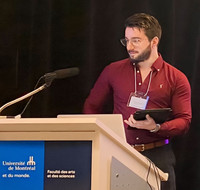Florian Pichon [il/lui]

Doctorat en études anglaises
Codirection : Jane Malcolm et Alex Ferrone
Titre de la thèse : Pyramids of the American Family: The Disintegration of the Household in Postwar American Literature
Contact : florian.pichon@umontreal.ca
Thesis Abstract
My thesis explores the duality of the American family home, symbolically perceived as a pyramid, both protective and ominous, reflecting the duality of the Latin word Sacer, signifying both the sacred and the accursed, the paradigm of the idealized home and the grave of familial harmony. This study aims to deconstruct the idealization of the nuclear family during the post-war period (1945-1960), a time when the media promoted this family model as accessible and healthy, while concealing its underlying dysfunctions.
A variety of literary works from this period, from Steinbeck to Williams, highlights the cracks in this model, particularly debunking the role of the father as an infallible financial pillar. The analysis of instances embodying an alternative to the rigid verticality of traditional lineage offers fertile ground for a queer reading of the paternal figure, as a true negativity of the Child's future.
This thesis underscores the instabilities in the vertical transmission of values and parental projection, and in the horizontal consolidation of a hierarchical order and financial prosperity.
It also strives to fill a gap in academic literature by recognizing the importance of the Karpman dramatic triangle in literary studies (often overshadowed by Girardian triangular mimetic desire) and the significance of the Sierpiński triangle. By reflecting aspects of the family with a fractal structure, an individual character often embodies global contradictions. This "structural dysfunctionalist" approach offers new perspectives on the representation of the American family by exploring recurring motifs and systemic manifestations within households in crisis.
Résumé de la thèse
Ma thèse explore la dualité de la maison familiale américaine, symboliquement perçue comme une pyramide, à la fois protectrice et funeste, reflétant la dualité du latin Sacer, aussi bien le sacré que le maudit, le paradigme du foyer idéalisé et de la tombe de l'harmonie familiale. Cette étude vise à déconstruire l'idéalisation de la famille nucléaire lors de la période d’après-guerre (1945-1960), période durant laquelle les médias ont promu ce modèle familial comme étant accessible et sain, tout en occultant les dysfonctionnements sous-jacents.
Une variété d'œuvres littéraires de cette époque, de Steinbeck à Williams, met en lumière les fissures de ce modèle, en s'attaquant notamment à la critique du rôle du père comme pilier financier infaillible. L’analyse d’instances qui incarnent une alternative à la verticalité rigide de la filiation traditionnelle offre un terrain fertile pour une lecture queer de la figure paternelle, véritable négativité du futur de l’Enfant.
Cette thèse met en évidence les instabilités dans la transmission verticale des valeurs et la projection parentale, et dans la consolidation horizontale d'un ordre hiérarchique et d'une prospérité financière.
Elle s'efforce par ailleurs de combler un manque dans la littérature académique en reconnaissant l’importance du triangle dramatique dans les études littéraires (bien trop éclipsé par le désir triangulaire girardien) mais aussi celle du triangle de Sierpiński. En effet, en reflétant des aspects de la famille avec une structure fractale, un personnage individuel incarne souvent les contradictions globales. Cette approche « dysfonctionnaliste structurelle » offre de nouvelles perspectives sur la représentation de la famille américaine par une exploration des motifs récurrents et des manifestations systémiques au sein des foyers en crise.